Wildfires Bring 'Climate Trauma'
Air Date: Week of January 10, 2025
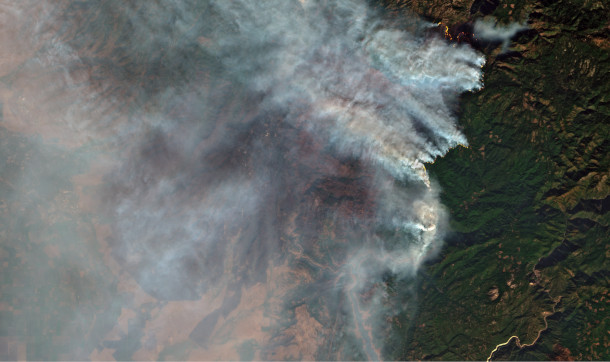
The 2018 Camp Fire was California's deadliest and most destructive wildfire to date, burning over 153,000 acres and destroying nearly 19,000 structures, including the town of Paradise. Located in Northern California’s Butte County, it is approximately 500 miles north of the recent wildfires affecting Southern California and the Los Angeles region. (Photo: Pierre Marcuse, Flickr, CC BY 2.0)
Wildfires like those hitting southern California take an enormous social and psychological toll on victims and observers alike. Jyoti Mishra is a professor of psychiatry at the University of California, San Diego and joins Host Jenni Doering to discuss how people and communities can heal from the ‘climate trauma’ brought by wildfires and other disasters linked to the climate crisis.
Transcript
CURWOOD: From PRX and the Jennifer and Ted Stanley Studios at the University of Massachusetts Boston, this is Living on Earth. I’m Steve Curwood.
DOERING: And I’m Jenni Doering.
[FIRE SOUND – BBC https://www.tiktok.com/@bbcnews/video/7457940962195574049?is_from_webapp=1&web_id=7457962656554550827 ]
DOERING: The catastrophic wildfires that have hit Southern California are acute symptoms of the climate emergency. Climate disruption is driving rapid oscillation between massive rainstorms that promote underbrush, followed by periods of drought that dry that underbrush into tinder for wind-driven sparks. Not only are people hurt and property destroyed, the huge wildfires also sear communities and the mental health of both victims and observers. Jyoti Mishra is an Associate Professor in the Department of Psychiatry at the University of California San Diego. She and colleagues from California State University, Chico studied the psychological and social impacts of the 2018 Camp Fire, California’s deadliest to that date, as well as the devastating 2023 Maui blazes.
MISHRA: Wildfires are climate disasters that we're seeing with increasing frequency in the world that we live in today and these can really, deeply impact mental health. In our work, we've shown that communities suffer from Post Traumatic Stress Disorder symptoms, also anxiety symptoms and depression symptoms even you know, many months after witnessing a climate disaster, and it can be so prevalent that up to 30 to 40% of community members can be suffering from these mental health symptoms.
DOERING: Wow, that's a huge toll. What about the cognitive impact? How do our brains react to these disasters?
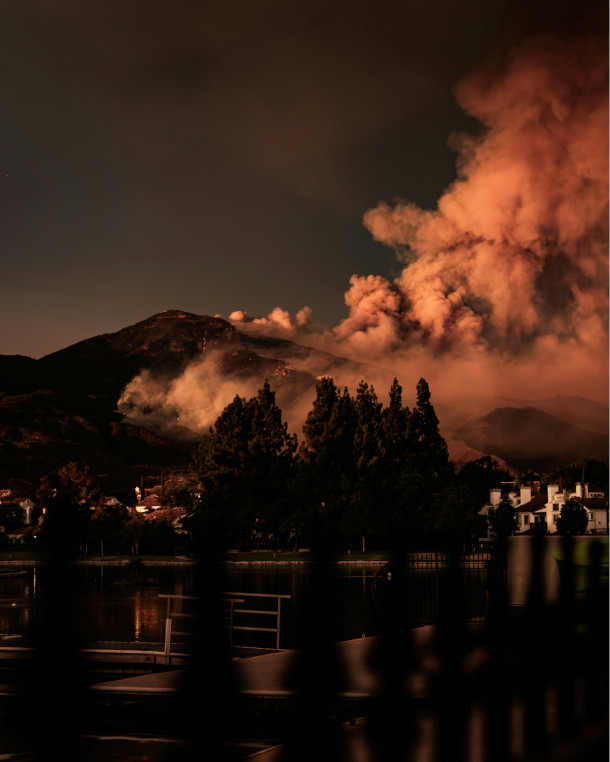
The Orange County Airport wildfire, also known as the "Airport Fire," began on September 10, 2024. It affected areas in Orange and Riverside counties and rapidly spread to over 19,000 acres with no containment reported initially. The fire disrupted air travel and blanketed nearby communities with heavy smoke, highlighting the region's growing wildfire challenges. (Photo: Daniel Lincoln, Unsplash)
MISHRA: There are definitely cognitive impacts observed not just in people who are directly exposed to the fires, but also to those who are indirectly exposed. So the difference between these individuals is that directly exposed are those who have suffered from loss of property or immediate impacts on their own family, whereas indirectly exposed individuals are those who have witnessed the fires in their community, in their immediate community, but have been fortunate to not have personal loss of any kind. We see that there can be cognitive impacts in both of these exposed individuals, whether directly exposed or indirectly exposed. The cognitive impacts can be poor ability to suppress distractions or ignore distractions in our environment, and therefore not being able to pay attention very well. This also then impacts how we make decisions, and underlying this, we find that our brains, especially the frontal cortex, which is responsible for executing all of our cognitive functions, that is hyper aroused. It is in a state of hyperactivity all the time, which is interpreted as if our brains are in this hyper alert state where everything in the environment could be threatening to us. And so imagine being in the state of someone who thinks that everything around them is a threat to their survival, then our brains are constantly computing that information, and it makes for a very tiresome effort and not being able to function very well cognitively.
DOERING: Yeah and I've heard people describe that cognitive arousal, that like hyper, anxious, aroused state, as just feeling like you can't turn your brain off and it's hard to sleep, right?
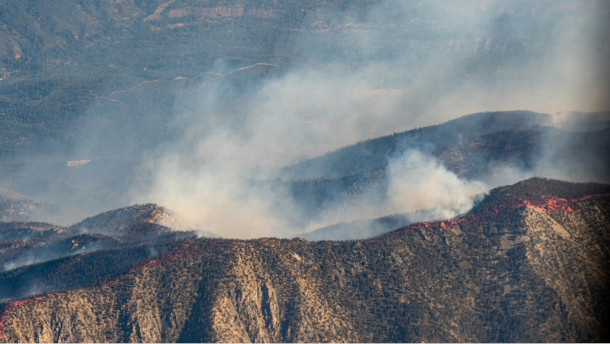
Wildfires have been intensifying in recent years as climate disruption worsens. This photo shows an aerial view of wildfires burning across California, between Joshua Tree and Los Angeles, in 2020. (Photo: Patrick Campanale, Unsplash)
MISHRA: Correct. Yes, we find a lot of sleep disturbances as part of this symptom you know, characteristics. Overall it's such a complex set of symptoms, it's not just PTSD, it's not just depression or anxiety. You see these cognitive effects and brain effects that the terminology is now understood as climate trauma. And it's its own beast that we now want to study on its own and deserves its own sort of recognition, awareness and characterization. Not just in the scientific literature, but also for our healthcare workers, our physicians, to know that when our communities are impacted by climate trauma, what kind of effects does it have on mental health and brain function and then provide appropriate treatments.
DOERING: What factors into how people can recover from a traumatic wildfire event?
MISHRA: Yes, I think several factors are important. Obviously, when one has greater means for recovery, when one has greater socioeconomics, then that can help towards rapid recovery. When one has greater healthcare access, then that helps in rapid recovery. Also having our health care physicians, our mental health care practitioners, recognize that there is this impact on our brains, on our mental health and well being, that climate trauma is a distinct entity that comes up after a climate disaster. Having that recognition and then getting proper treatment for that can make a big difference in resolution of that trauma. Having said that, we've also found that there are individual differences beyond one's means, such as for individuals who are physically fit, individuals who practice mindfulness. And then we also find that individuals who have a sense of stronger family ties and community ties, they also have lower symptom profiles.
DOERING: And you mentioned that mindfulness can actually be a part of this. Why is that?
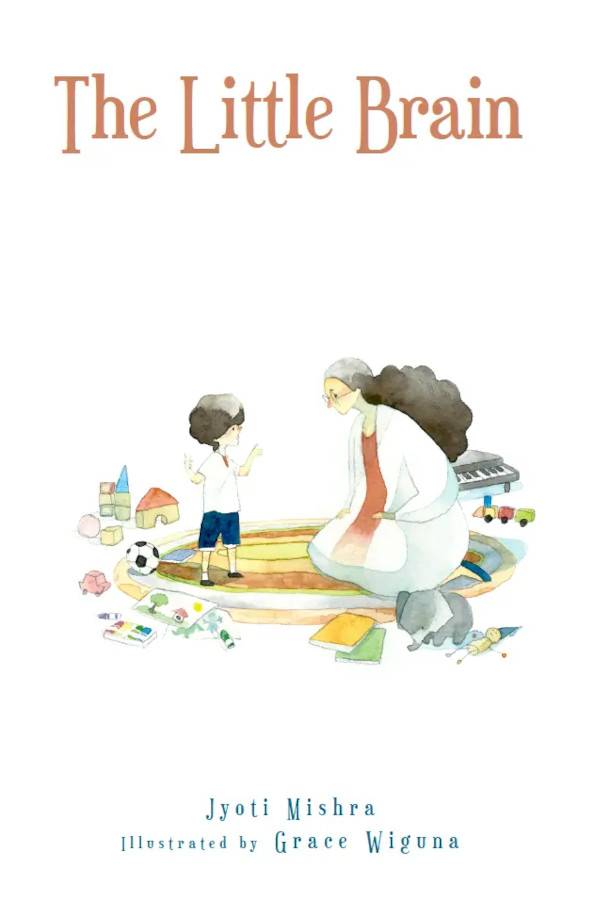
"The Little Brain" by Dr. Jyoti Mishra was published in 2022 by Fulton Books. The book is tied to a meaningful cause, as all proceeds support Dr. Mishra's brain health research. (Photo: Courtesy of Dr. Jyoti)
MISHRA: Well, we find the way mindfulness helps is that it helps you to compartmentalize the present moment. That you're in this present moment now and then when the fire is over, you are in a new moment and that new moment is not threatening anymore, and that you do not have to dwell in that prior moment. What happens is that our brains get stuck in that prior moment of being in the state of constant arousal that everything is threatening. Of course, everything is threatening when you are in the midst of a climate disaster, but when things are back to safety, then our brains need to understand that we're back in a safe place, and that's something that mindfulness can help with.
DOERING: Even in the midst of these disasters, we see people jumping in, trying to help out, you know, street vendors giving away food, people offering shelter in their homes for those who are fleeing fires. And then, of course, there's rebuilding that people pitch in for. What benefits can those kinds of activities bring for mental health in the wake of these disasters?
MISHRA: I think that's absolutely beneficial. Therapies that focus on psychological healing and mindfulness, compassion-based healing that are actually very effective, they work in this umbrella where one is able to look beyond oneself and embrace common humanity and be empathetic and compassionate towards common humanity, and that then brings well-being to oneself. And so I definitely recommend people to be part of these community efforts.
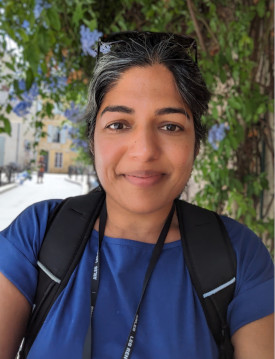
A professional headshot of Dr. Jyoti Mishra, Associate Professor in the Department of Psychiatry at the University of California San Diego. Dr. Mishra is also the founder of the Neural Engineering and Translational Labs (NEATLabs), where she leads research on mental health. (Photo: Courtesy of Dr. Jyoti)
DOERING: Jyoti, you're based in San Diego, not too far from the Los Angeles area wildfires. And of course, San Diego itself is no stranger to fires like these. How do you feel?
MISHRA: Um, I feel. Um…just give me one moment… Sorry. I have family here from LA, sorry.
DOERING: I'm so sorry.
MISHRA: Okay, I feel deep sense of emotion and sense of, a lot of grief for our families and our community members who have lost their homes or have suffered in these climate disasters, and it only helps to, us to continue to do the work that we do, and move towards working with our community partners to develop resiliency solutions, especially for our future generations, for our children. It's important that we move away from framework of doom and gloom to how together we can survive and thrive in this new world that we live in on Earth. We are facing difficult times, but if we work together, there's still time to bend the curve, to slow the warming and to witness a world where the number of disasters that are seen are reduced over time and we need our policy makers and our politicians, everyone to work together with us on this, but it really just increases our resolve to continue to do this work.
DOERING: Jyoti Mishra is an Associate Professor in the Department of Psychiatry at the University of California San Diego. Thank you so much, Jyoti.
MISHRA: Thank you. It was nice talking to you.
Links
Learn more about Dr. Jyoti Mishra
Explore the work of the Neural Engineering and Translational Labs
Living on Earth wants to hear from you!
Living on Earth
62 Calef Highway, Suite 212
Lee, NH 03861
Telephone: 617-287-4121
E-mail: comments@loe.org
Newsletter [Click here]
Donate to Living on Earth!
Living on Earth is an independent media program and relies entirely on contributions from listeners and institutions supporting public service. Please donate now to preserve an independent environmental voice.
NewsletterLiving on Earth offers a weekly delivery of the show's rundown to your mailbox. Sign up for our newsletter today!
 Sailors For The Sea: Be the change you want to sea.
Sailors For The Sea: Be the change you want to sea.
 The Grantham Foundation for the Protection of the Environment: Committed to protecting and improving the health of the global environment.
The Grantham Foundation for the Protection of the Environment: Committed to protecting and improving the health of the global environment.
 Contribute to Living on Earth and receive, as our gift to you, an archival print of one of Mark Seth Lender's extraordinary wildlife photographs. Follow the link to see Mark's current collection of photographs.
Contribute to Living on Earth and receive, as our gift to you, an archival print of one of Mark Seth Lender's extraordinary wildlife photographs. Follow the link to see Mark's current collection of photographs.
 Buy a signed copy of Mark Seth Lender's book Smeagull the Seagull & support Living on Earth
Buy a signed copy of Mark Seth Lender's book Smeagull the Seagull & support Living on Earth

